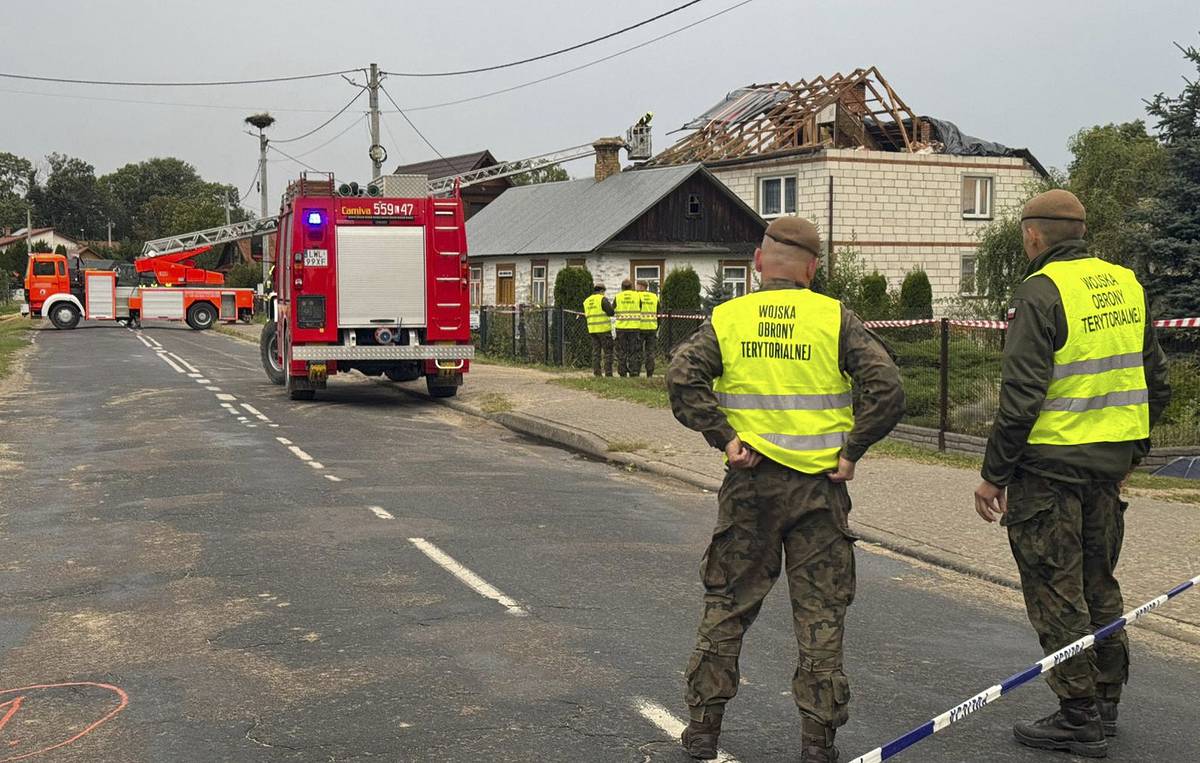By Tass
Copyright tass

MOSCOW, September 11. /TASS/. Analysts identify potential beneficiaries from a drone incident in Poland; Israel’s strike on Doha undermines talks and efforts to bring hostages back home; and France’s “Block Everything” protests signal a deep crisis. These stories topped Thursday’s newspaper headlines across Russia.
Izvestia: Who’s behind drone incident in Poland
The Europeans seek to exploit any notable event to disrupt negotiations on Ukraine, said analysts interviewed by Izvestia. On Wednesday, the Polish authorities reported that unidentified drones had entered the country’s airspace. Warsaw and Brussels rushed to blame the incident on Russia, while NATO took the time to assess the situation. The Russian Defense Ministry expressed readiness to hold consultations with Poland, and Russian diplomats stressed that no proof of Moscow’s involvement had been presented. Warsaw invoked Article 4 of the North Atlantic Treaty, which provides for consultations between NATO member states. The fact that Poland did not activate Article 5 on a joint military response shows that Warsaw does not view this as a grave threat, Ivan Loshkaryov, associate professor with the Department of Political Theory at the Moscow State Institute of International Relations, observed.
According to him, two parties could benefit from the current situation. First, it’s the Polish government, which needs to do something to boost its popularity. Besides, the drone incident in Poland also benefits Ukraine, and now, the Vladimir Zelensky regime will try to use it for self-promotion. There are enough “hawks” in the European Union, who seek to continue using Ukraine as a tool to deter Russia and resolve their own domestic problems, Diplomatic Academy Vice Principal Oleg Karpovich said.
However, NATO won’t be able to give a military response without the United States. But Washington is not interested in escalating the conflict with Russia at this stage. And since the US is unlikely to join a potential military response, NATO’s European members simply won’t be strong enough to act alone, Loshkaryov emphasized.
Meanwhile, the likelihood is very low that Russian drones could have strayed into Poland, military expert Alexey Leonkov noted. “The fact is that the drones launched at Ukraine’s western regions always follow a flight plan. And our new military satellites in orbit track their movement,” the expert stressed.
In his view, the provocation’s aim was to provide the so-called “coalition of the willing” with leverage to pressure US President Donald Trump in order to somehow drag the United States back into the Ukraine conflict or at least make it offer security guarantees to Europe.
Media: Israeli strikes undermine talks, efforts to return hostages home
Israel expanded military operations against Hamas beyond the Gaza Strip by conducting an airstrike on the movement’s leaders in the Qatari capital. The operation in Doha has triggered a wave of criticism worldwide. Inside Israel, part of the public has voiced fears and concern, pointing to the risks of talks being derailed and the lives of hostages being put in jeopardy. The Palestinian movement’s leaders survived the attack. Meanwhile, Hamas’ military wing has started preparations for military actions against the Israeli army, which plans to begin a ground operation in Gaza City soon, Izvestia writes.
Muhammad al-Masri, a Palestinian security expert, believes that the Israeli strike on Doha was primarily aimed at achieving a political rather than a military goal. In his view, the killing of Hamas leaders alone would not change the strategic picture, so the main aim was to weaken international efforts, including the process of recognizing the Palestinian state by a number of countries.
The surviving Hamas leaders may relocate to Turkey, Lebanon or Iran, which could turn those countries into potential targets for future Israeli operations. However, according to Ilya Shcherbakov, researcher with the Department of Political Science at Moscow State University, “one could assume that Israel won’t take the same stance toward Turkey as toward Qatar.” Ankara is regarded as an important link in the NATO chain, with significant military resources and long-standing cooperation with Washington.
The Israeli strike on Doha is a tool the Jewish state employed to exert political pressure on the Hamas leadership in order to secure favorable conditions for ending the war in the Gaza Strip, Boris Dolgov, leading researcher with the Center for Arab and Islamic Studies at the Russian Academy of Sciences’ Institute of Oriental Studies, told Vedomosti. Although the attack will stall negotiations for the time being, the Islamists have no intention of breaking off dialogue with Israel because it is the only chance for Hamas to end its confrontation with the Jewish state and, ultimately, ensure the organization’s political survival, the expert added.
Media: French protesters seek to ‘block everything’ president proposes
Mass protests calling to “block everything” were held in France on the day when a new prime minister, Sebastien Lecornu, assumed office. The French people are frustrated with the burden of economic problems and the overall policy of President Emmanuel Macron. The country is sinking deeper into a political crisis and there is no solution in sight, Nezavisimaya Gazeta notes.
No clear demands for the government have been set out so far. The protesters are largely united by a general opposition to Macron’s policy. In this regard, the Block Everything movement resembles the Yellow Vests. Trade unions also plan to stage demonstrations in a week, on September 18. All this shows that discontent with the president’s activities and the budget spending cuts proposed by the former prime minister has reached a critical level.
It seems that both parliament members and voters are against Macron’s appointee. “Lecornu will have to maneuver and search for compromises. However, it’s not clear yet how to build dialogue with the three forces that are hostile to each other – the far-right, the left and Macron’s centrists. The new head of government will have to draft and hold consultations on a budget that will provide for tough austerity measures, which the entire opposition is going to loathe,” Sergey Fyodorov, leading researcher at the Russian Academy of Sciences’ Institute of Europe, noted. Still, it won’t be easy for Lecornu to back down. “It’s no longer possible to expand the national debt, which has reached 114% of GDP,” the analyst explained.
Macron is also likely to find himself at a disadvantage. “If the president fails to reach an agreement with lawmakers, he will have to dissolve the lower house. However, opinion polls show that the far right, namely the National Rally and its allies, would lead in a snap election. The stalemate points to a crisis in the Fifth Republic, which is based on strong powers of the president, who is supposed to appoint a prime minister and serve as an arbiter between the government and parliament.
Meanwhile, Pavel Timofeyev, head of the Section for Regional Issues and Conflicts at the Russian Academy of Sciences’ Institute of World Economy and International Relations, told Vedomosti that the protests would hardly have a serious impact on the political situation in France because the parliamentary opposition saw them merely as a tool, similar to spontaneous anti-coronavirus protests and the Yellow Vests movement. “This is what they need to draw attention to themselves and remind everyone that the media coverage of current developments can be used to pressure Macron,” he noted.
Nezavisimaya Gazeta: US arms ‘dragon’ with missiles to threaten China
The United States and Japan will hold joint military drills on September 11-25, dubbed Resolute Dragon. Such maneuvers occur on a regular basis, but this year, the Americans will deploy a Typhon medium-range missile system and a Navy Marine Expeditionary Ship Interdiction System (NMESIS) to Japan for the first time ever. The Japanese media describe the deployment of these weapons as a temporary measure but put the word “temporary” in quotation marks, implying that the systems could stay in Japan for a while. Tokyo and Washington are strengthening their means of deterrence against China, hinting that one day, they might have to defend Taiwan, Nezavisimaya Gazeta writes.
“The deployment of the United States’ medium-range missiles to Japan marks a step towards escalating contradictions between the US, its ally Japan, and China,” said Alexander Lukin, research director at the Russian Academy of Sciences’ Institute of China. “However, Russia is not the one to remain indifferent to these developments. The reason is that technically, US missiles are capable of reaching Russia’s Far East. Of course, they are primarily targeted at China because Beijing continues to expand its missile and nuclear forces and has even showcased them at a recent parade. Moreover, it has not joined talks on the matter and is reluctant to disclose the size of its nuclear arsenal,” the analyst pointed out.
Lukin noted that initially, talks between the US and Soviet Union had only covered Europe. Under the Intermediate-Range Nuclear Forces (INF) Treaty, the US removed its Pershing missiles from the European continent. However, Washington later withdrew from the treaty. And as for Asia, there has never been an agreement like that. So, formally, the US is not violating anything. Still, China is not happy about this, and it has every reason to be concerned. The same applies to North Korea.
“Russia and China cannot be ruled out to give a coordinated response to this threat. In any case, talks will be held on the issue. Meanwhile, Russia could station missiles somewhere in the Far East. Tensions will continue to rise until an agreement is reached,” Lukin concluded.
Izvestia: EU continues to close down large factories, plants
The number of large factories and plants that have been closed down in the EU has reached the highest level since 2009: 72 facilities shut operations between January and August, leaving 18,000 people jobless. The number wasn’t so high even during the coronavirus pandemic. Experts interviewed by Izvestia believe that the European Union’s markets are losing money because of member states’ spending on support to Kiev, as well as due to their decision to abandon Russian energy.
St. Petersburg State University Professor Natalya Yeryomina points out that the European Union’s production has been in decline for quite a while, and it is certain to have long-term effects. The trend to close down manufacturing facilities or move them to Asia emerged a long time ago, but sanctions on Russia turned out to be the final blow for industries, the analyst said.
Dmitry Suslov, deputy director of the Center for Comprehensive European and International Studies at the Higher School of Economics, noted that the deindustrialization process was gaining momentum in Europe. European countries’ attempts to take advantage of rearmament programs and an increase in military production in order to breathe new life into industries have so far failed to lead to the desired outcome. In certain cases, industrial production is indeed growing but this is not strengthening the economy in general, he explained.
“The overall picture shows Europe’s ongoing deindustrialization, with the loss of access to Russian energy being the fundamental cause behind the crisis,” the expert emphasized. Suslov added that the European Union sought to continue reducing Russian energy imports, meaning that the situation could deteriorate further. “This will make European manufacturers lose competitiveness compared to the countries of the global majority, primarily China, as well as other developing non-Western economies. The problem is only getting worse given that Europe is considering secondary sanctions and tariffs on China and India due to their import of Russian oil,” the analyst remarked.
Suslov is confident that the decision to abandon Russian energy and tensions in trade relations with key non-Western countries, including BRICS members, may have disastrous consequences for Europe. In his view, the deindustrialization process has already led to serious negative social implications, and the trend will only intensify.
TASS is not responsible for the material quoted in these press reviews



